

Twitter. Tandfonline. INDEx Appendix A. Student Digital Activities. Understanding the Early Adjustment Experiences of Undergraduate Distance Education Students in South Africa. Desire path. A desire path (often referred to as desire line in transportation planning, and also known as a game trail, social trail, herd path, cow path, goat track, pig trail, use trail or bootleg trail) is a path created as a consequence of erosion caused by human or animal foot-fall traffic.
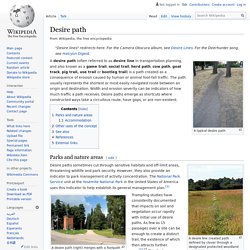
The path usually represents the shortest or most easily navigated route between an origin and destination. Width and erosion severity can be indicators of how much traffic a path receives. Desire paths emerge as shortcuts where constructed ways take a circuitous route, have gaps, or are non-existent. Children's data and privacy online. This project led by Professor Sonia Livingstone seeks to address questions and evidence gaps concerning children’s conception of privacy online, their capacity to consent, their functional skills (e.g. in understanding terms and conditions or managing privacy settings online), and their deeper critical understanding of the online environment, including both its interpersonal and, especially, its commercial dimensions (including its business models, uses of data and algorithms, forms of redress, commercial interests, systems of trust and governance).
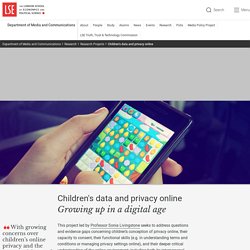
For the launch presentation, see here. For a short video about the project, see here. v31 #3 Putting Our Students at the Heart of What We Do — eTextbooks at the University of Manchester - Against The Grain. By Olivia Walsby (Reading List Services Manager, University of Manchester) and Flora Bourne (eTextbook Coordinator, University of Manchester) The Books Right Here Right Now Project.
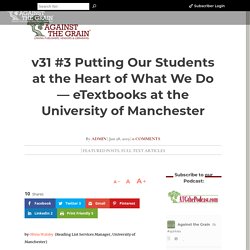
Survey shows nearly half of students distracted by technology. With your existing account from... {* loginWidget *} With a traditional account... {* #signInForm *} {* signInEmailAddress *} {* currentPassword *} Create Account {* poweredByJanrain *}
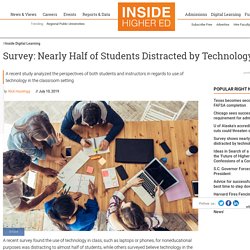
Once upon a time: hearing student stories. Rcpch screen time guide final. Love them or hate them? Bringing emotions into the study of assisted living technologies. This is a picture of Trish’s bicycle.
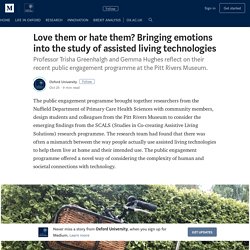
It’s heavy, slow and only has three gears, but of all her bicycles it’s the one she likes best. She got it from the charity Elephant Bike, who recondition old Post Office bikes; they send one to Africa for every one they sell in the UK. An Error Occurred Setting Your User Cookie. Online Report Card: Tracking Online Education in the United States. EIG1605. LSE.
Attention Alert: A Study on Distraction Reveals Some Surprises. Recently my research team observed nearly 300 middle school, high school and university students studying something important for a mere 15 minutes in their natural environments.
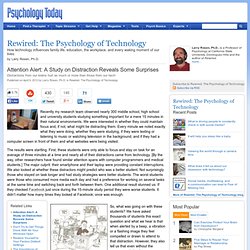
We were interested in whether they could maintain focus and, if not, what might be distracting them. What do students entering HE expect from digital technologies? When we come across new technologies or digital platforms for the first time in further and higher education (HE), how do we decide what the technology does or should do, and how we can use it to help us?
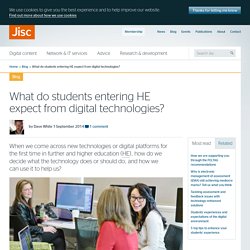
In the digital student project we have been investigating incoming students’ expectations of the digital environment in HE. Institutions will be working to meet or manage expectations as hundreds of thousands of new students arrive in September but it’s no small task to build a picture of students’ hopes and aspirations when there are modules to rewrite and technology to update over the summer.
In Their Own Words. To tweet next week. @elesig #oldfavourites #summerreading. Tweeted. OER_Hub : Love #oer? Interested in #impact? ... Texts, Snapchats, Instagram: Translating Teens’ Online Behavior. How much surveillance should parents have over their teenagers’ social media lives?
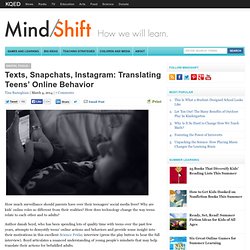
Why are kids’ online roles so different from their realities? How does technology change the way teens relate to each other and to adults? Author danah boyd, who has been spending lots of quality time with teens over the past few years, attempts to demystify teens’ online actions and behaviors and provide some insight into their motivations in this excellent Science Friday interview (press the play button to hear the full interview). Boyd articulates a nuanced understanding of young people’s mindsets that may help translate their actions for befuddled adults. An excerpt from danah boyd’s It’s Complicated Children love to experiment with encoding messages. The practice of hiding in plain sight is not new. Author danah boyd These practices are not new. When Carmen, a Latina seventeen-year-old living in Boston, broke up with her boyfriend, she “wasn’t in the happiest state.”
Breaking Boundaries. What 5 Tech Experts Expect in 2014 - Technology. Education technology enjoyed a headline-grabbing year in 2013.
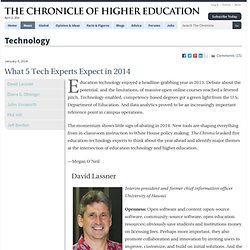
Debate about the potential, and the limitations, of massive open online courses reached a fevered pitch. Technology-enabled, competency-based degrees got a green light from the U.S. Department of Education. And data analytics proved to be an increasingly important reference point in campus operations. The momentum shows little sign of abating in 2014. Gaming Unplugged Since 2000. What Do Unsuccessful Online Students Want Us to Know? Help us understand learner experiences in Open Online Courses and MOOCs? [January 21] Internet Skills and Wikipedia's Gender Inequality. January 21, 2014 at 12:30pm ETBerkman Center for Internet & Society, 23 Everett St, 2nd Floor Although women are just as likely as men to read Wikipedia, they only represent an estimated 16% of global Wikipedia editors and 23% of U.S. adult Wikipedia editors.
![[January 21] Internet Skills and Wikipedia's Gender Inequality](http://cdn.pearltrees.com/s/pic/th/internet-wikipedia-inequality-75275203)
AECT RTD Professional Development Webinar on Learning Analytics. Enilda Romero-Hall and Min Kyu Kim have organized the second AECT Research and Theory division Professional Development Webinar session. Join us! » Student questionnaire – baseline data JISC Employability. Posted on: 1 February 2013 By: Project manager No Comments » Filed under: digital literacy, surveys Shortly before Christmas Boris, our doctoral researcher, presented the findings of our student questionnaire to the Project Board and Delivery Group and it made for an interesting meeting. Hashtags and retweets: using Twitter to aid Community, Communication and Casual (informal) learning. Peter Reed* Centre for Excellence in Evidence-Based Learning and Teaching, Institute of Learning & Teaching, Faculty of Health & Life Sciences, University of Liverpool, Liverpool, United Kingdom (Received 18 September 2012; final version received 13 July 2013; Published: 12 September 2013) Since the evolution of Web 2.0, or the Social Web, the way in which users interact with/on the Internet has seen a massive paradigm shift.
Web 2.0 tools and technologies have completely changed the dynamics of the Internet, enabling users to create content; be it text, photographs or video; and furthermore share and collaborate across massive geographic boundaries. As part of this revolution, arguably the most significant tools have been those employing social media. Keywords: Twitter; communication; personal learning environments; Digital Natives/Immigrants; Digital Visitors/Residents *Email: peter.jp.reed@gmail.com Research in Learning Technology 2013. © 2013 P.